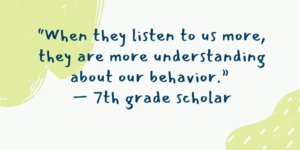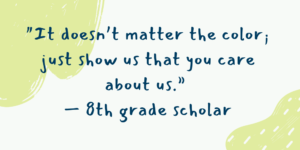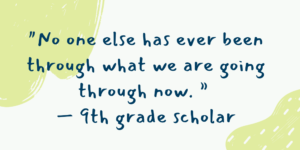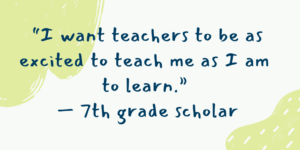
This fate is not the case for all, but it is for far too many scholars, including scholars like me. I was a gifted elementary school scholar, happy and eager to learn. By high school, I was disengaged; I skipped class and took extra lunch periods because I found more than half my classes completely irrelevant, or I felt disconnected from my teacher. In addition, I lacked the self-management skills to handle all the complexities and distractions of my large high school. In reflecting on the article, my own experiences, and my daily observations in schools, I say we need to get “back to the basics” of education: reading, ‘riting, ‘rithmetic, and relationships.

One of the reasons I wanted to work at CT3 is because of the No Nonsense Nurturer® component of building life altering relationships. I loved that relationships were elevated as the foundation for really reaching and teaching all scholars. The only way you can really have an authentic relationship with anyone is to allow space for a two-way dialogue to occur. Too often, the voices in schools are dominated by adults. Scholars are thereby relegated to passively participating in their own learning! When we elevate scholar voice, we know who they are, what they know, what they need, and most importantly, what motivates them! If you ask them, they will tell you. Elevating scholar voice is the key catalyst to building those authentic relationships.

There are many ways to bring scholar voice into your classroom and school. The more you can get scholars talking and sharing, the stronger the bond they feel with their teachers and schoolmates. These small, formal and informal interactions set the stage for mutual understanding, connection, and trust. That trust gives you the currency to push scholars to higher and higher levels of performance. They think, “Of course my teacher has my back! She knows me, my family, my best friend, and I know her daughter’s name. I see a picture of her dog, Otis, on her desk. We know and care about each other. She will support me, and I want to do my best for her.” That is the desired inner monologue we want our kids to have. We want them to feel safe and secure that the adults around them see, know, and understand them. We want them to know that we are invested in helping them to succeed, not just manage them through a series of mundane tasks.

Embed opportunities for scholar voice throughout your core content classes and through rituals that normalize youth voice, agency, and leadership. Here are a few concrete examples of how you can elevate scholar voice, encourage two-way dialogue, and strengthen relationships in your schools:
|
In the Classroom |
In the School |
|
|
To get firsthand accounts of what scholars need to feel more engaged at school, I posed the following question to some secondary scholars: “What do we need to know to teach today’s generation?” The children were nearly unanimous in their desire for more connection and understanding.
- “When they listen to us more, they are more understanding about our behavior and try to teach us better.” — 7th grade scholar
- “Teachers should check in with kids to find out what they might have going on before starting to nag us about the work. Once I feel like my teacher knows what’s going on with me, I am more open to doing the work… It doesn’t matter the color; just show us that you care about us.” — 8th grade scholar
- “I want teachers to be as excited to teach me as I am to learn.” — 7th grade scholar
- “Teachers should make it more of their mission to put themselves in their scholars’ shoes. No one else has ever been through what we are going through now. Try to understand our perspective and know that everyone doesn’t learn the same way.” — 9th grade scholar
Today, educators are working to address the impact of the COVID-19 pandemic. That, combined with the intensity of the social-political unrest in our nation and world, has had a major impact on the mental health of our youth. As we implement reading programs, math tutoring, and other learning interventions to address learning loss, we must also remember to prioritize relationships. They help us gain the trust, engagement, and motivation for our scholars at this critical time in all our lives. Authentic connection with others is the first step to rebuilding thriving learning communities.
By Stephanie Jarrett-Thorpe, Managing Associate
Check out CT3 Education programs such as No-Nonsense Nurturer, Real Time Teacher Coaching, and Real Time Leadership Coaching to find out more about Professional Development for Teachers and Leaders, classroom management strategies, and building relationships with students and their families, and properly addressing different issues in the classroom/school.
Category: Anti-Racism


